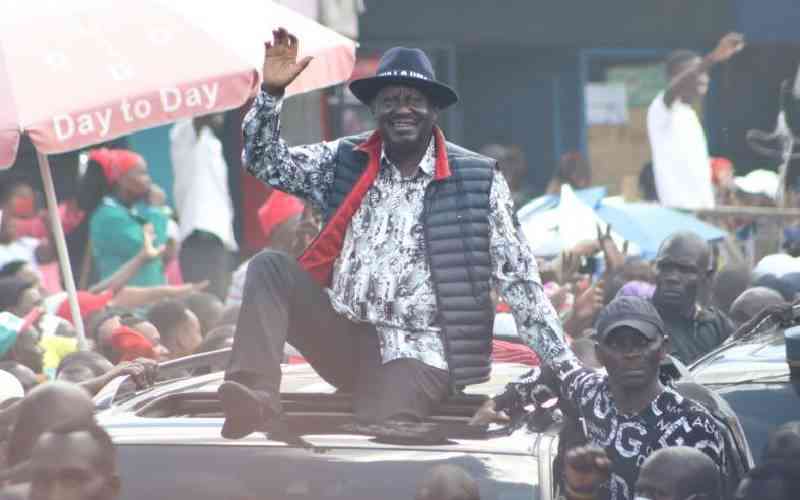Few leaders in Kenya’s modern history embody ideological consistency as profoundly as the late Prime Minister Raila Amolo Odinga. Through decades of struggle, exile, detention, and reform, Raila’s political vision has remained anchored in two interwoven convictions, the dispersal of power through devolution and the pursuit of gender equity. Both were not simply political positions; they were pillars of a democratic creed grounded in inclusion, participation, and social justice.
The story of Kenya’s 2010 Constitution cannot be told without appreciating the political negotiation and ideological trade-offs that shaped it. At the heart of that process was the clash between the Orange Democratic Movement (ODM), led by Raila, and the Party of National Unity (PNU), led by President Mwai Kibaki. ODM advanced a vision of a parliamentary democracy with devolution, reflecting Raila’s long-held belief in local empowerment and shared governance. PNU, on the other hand, favoured a presidential system with centralised authority, wary that devolution could fragment the state or weaken executive coherence.
What emerged in 2010 was a delicate constitutional compromise, a presidential system fused with strong devolution. Raila conceded to a presidential model, while PNU dropped its resistance to devolved governance. The exchange was not merely tactical, it was ideological and this is important in understanding Raila as the general of ODM party or ‘chungwa’ as the symbol in the referendum. It reflected Raila’s ability to prioritise structural justice over personal political ambition. He was willing to forgo the parliamentary model he preferred, provided that devolution, the vehicle for equitable development and inclusive politics became entrenched in the Constitution.
This moment revealed what constitutional scholar Yash Pal Ghai once described as “the transformative character of Kenya’s constitutional reform, a people’s response to exclusion and authoritarian centralism.” Raila grasped this transformation intuitively. His fight for devolution was not about administrative convenience but about redistributing power, ensuring that political and economic opportunities reached the peripheries long neglected by central rule.
Follow The Standard
channel
on WhatsApp
From his early days in the pro-reform movements of the 1980s, Raila had seen first-hand how the concentration of authority in the presidency enabled oppression and patronage. He recognised that democracy without diffusion of power was hollow. As political theorist Alex de Tocqueville observed centuries ago, liberty survives only when citizens participate meaningfully in decisions that affect their lives. Raila’s push for county governments, equitable revenue allocation, and local accountability echoed this principle. In the constitutional debates, he often framed devolution as the “people’s government”, not in abstract populist terms but as a constitutional mechanism to achieve the moral ends of freedom and fairness. He viewed devolution as both a political instrument and a moral covenant, a bridge between law and livelihood. That fusion of legal philosophy and social justice is what made his advocacy enduring.
Equally central to Raila’s ideology was his unwavering defence of gender equality. He did not treat women’s empowerment as an afterthought or campaign slogan but as an essential measure of national progress. His political conduct consistently reflected this belief, from backing the constitutional “two-thirds gender principle” to championing women’s representation in county assemblies and national institutions. Gender scholars such as Prof Maria Nzomo have long argued that gender equity in governance is not just a social issue but a democratic necessity. Raila’s consistent alignment with that reasoning was evident in both policy and practice. He appointed women to key positions in his Cabinet as Prime Minister, supported affirmative action in political party nominations, and defended gender parity clauses in the Constitution even when they met resistance within Parliament.
His gender advocacy stemmed from the same ideological source as his defence of devolution, a belief in inclusion as justice. To Raila, the marginalisation of women mirrored the exclusion of regions under centralised rule. Both devolution and gender equity represented struggles to widen the circle of citizenship. In his words, “A nation cannot develop if half of its people are left behind.” That philosophy situates him among leaders who understand democracy not as a static system but as a living pursuit of equality. Political economist Amartya Sen argued that freedom is both the means and the end of development. Raila’s politics embodied this duality. Devolution and gender equality were not just reforms to him; they were expressions of freedom’s social dimension enabling people, especially women and local communities, to define their destinies.
Critics often accused him of political pragmatism, but even his compromises were ideologically consistent. The 2010 trade-off, where he accepted a presidential system in exchange for institutionalised devolution, was a masterclass in strategic idealism. He recognised that the architecture of governance matters less than its capacity to empower citizens. The Constitution that resulted from that negotiation reflects his imprint, 47 devolved units and women’s representation.
Legal theorist John Rawls posited that justice is fairness. In Raila’s legacy, justice meant fairness in power and opportunity, whether between men and women, or between Nairobi and Turkana. That interpretation of justice guided his politics, his reform advocacy, and his moral appeal. Even in opposition, Raila continued to defend devolution from encroachment, cautioning against recentralisation through budgetary manipulation or administrative control. His insistence that counties receive their full share of resources, his support for fiscal autonomy, and his defence of governors’ rights to implement local priorities were unequivocal.
Follow The Standard
channel
on WhatsApp
By Ndong Evance


